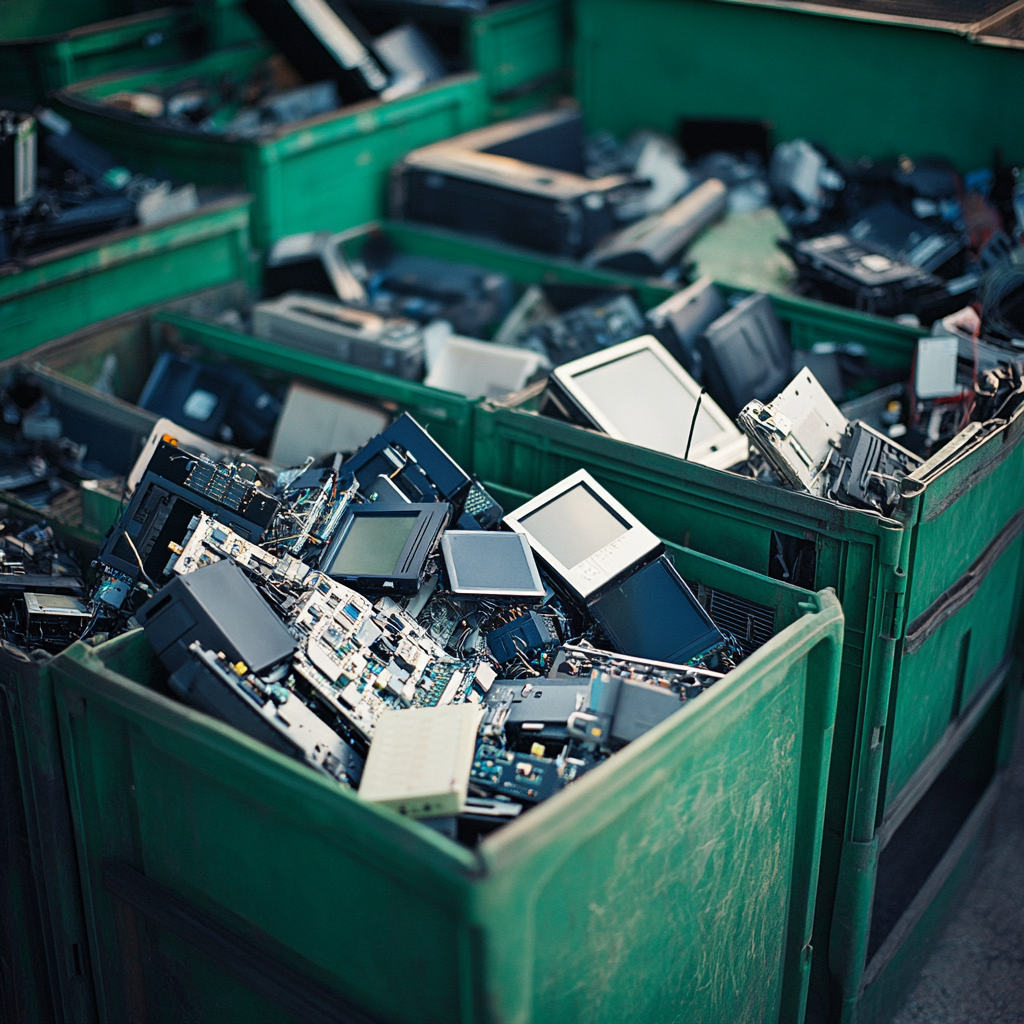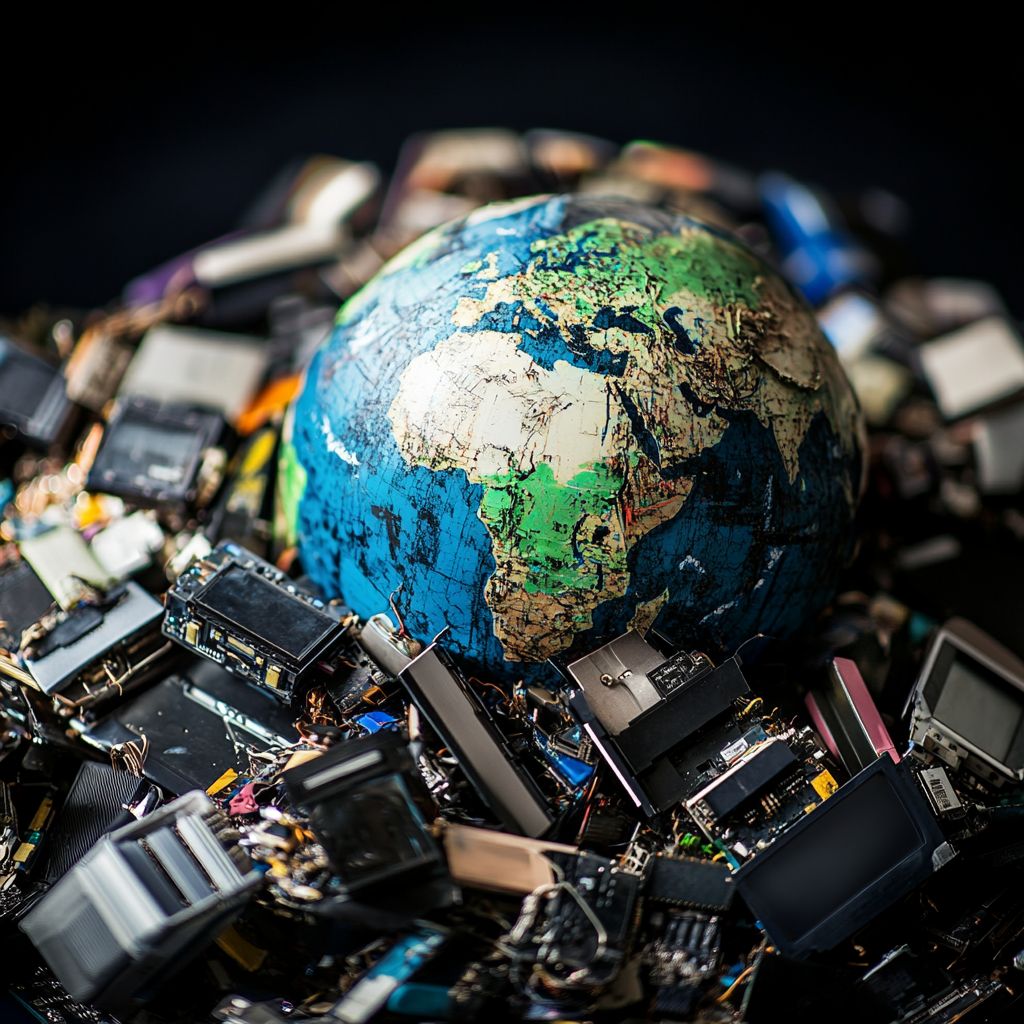

Implementing sustainable digital waste recycling in your business requires a strategic approach that protects the environment and enhances your company’s reputation. Start by conducting an e-waste audit to identify all electronic devices, particularly mobile phones, within your operations, ensuring you understand what assets you possess. Next, develop an e-waste policy outlining your commitment to recycling e-waste responsibly, including safely disposing of toxic substances. Train employees on this policy to foster a culture of sustainability. Partner with certified IT Asset Disposition (ITAD) companies to ensure safe e-waste processing, mainly when extracting precious metals. Establish an internal recycling program that encourages the refurbishment and repurposing of electronics. Regularly review your e-waste management practices to ensure compliance with local regulations and adapt to new sustainability standards. Finally, consider creating a take-back program that allows customers to return their old devices, further promoting a circular economy. By following these steps, your business can effectively manage digital waste while supporting environmental responsibility.
Embracing the principles of a circular economy through efficient e-waste management, particularly for mobile phones and electrical items, aligns your business with sustainable practices and offers tangible financial benefits. The recycling process for these devices enables the recovery of valuable resources like metals and plastics, significantly reducing the need for costly raw materials. This practice cuts production costs and can improve your company’s bottom line by generating new revenue streams through the resale of refurbished assets. Additionally, a commitment to responsible e-waste management enhances your brand’s reputation, attracting environmentally conscious customers and investors. As local authorities increasingly promote sustainable practices, businesses that recognise sustainability’s financial and reputational advantages can position themselves as leaders in environmental responsibility, especially in tackling the fastest-growing waste streams.
Properly managing e-waste is crucial for transforming potential environmental hazards into valuable opportunities for your organisation. By adopting effective practices to recycle e-waste, businesses can tap into the hidden resources within unwanted electronics, including valuable metals, ferrous metals, plastics, and electronic components that can be recycled or repurposed. Utilising a local recycling centre helps reduce the financial burden of sourcing raw materials and creates new revenue streams through the resale of refurbished electronics. Moreover, a proactive approach to e-waste management emphasises your company’s commitment to sustainability and human health, fostering trust and loyalty among eco-conscious customers and stakeholders. By ensuring proper disposal of items like cathode ray tubes, what may seem like trash can be elegantly converted into treasure, positioning your organisation at the forefront of resource efficiency and environmental responsibility.
Compliance with e-waste regulations is not just a legal requirement but a strategic advantage for businesses in today’s environmentally-conscious marketplace. By following guidelines like the UK’s Waste Electrical and Electronic Equipment (WEEE) Regulations, companies can mitigate the risks of legal penalties and reputational damage. Proper electronic components and recycling e-waste management through certified recycling facilities allow businesses to handle hazardous substances and other materials responsibly. Additionally, demonstrating compliance reinforces a company’s commitment to sustainable practices, attracting customers and partners who prioritise environmental responsibility. As regulations evolve, proactive engagement with compliance ensures businesses can adapt their supply chain to align with best practices. Ultimately, staying ahead of the curve on e-waste regulations enhances operational effectiveness while positively impacting societal and ecological needs.
Responsible e-waste management goes beyond environmental compliance; it paves the way for business innovation and growth. By incorporating sustainable practices into their operational frameworks, companies can effectively manage electronic products and reduce their ecological footprint while unlocking new development opportunities through urban mining. This commitment enhances brand reputation, attracting eco-conscious consumers and investors. Additionally, adopting advanced recycling techniques, such as manual sorting and recovering valuable materials like copper motors, can streamline operations and reduce costs, leading to significant economic benefits. As businesses embrace the circular economy, they position themselves as leaders in sustainability, driving competitive advantage and fostering long-term growth while positively impacting the planet’s health.
Properly disposing of electrical and electronic equipment, including mobile phones, offers significant cost benefits for businesses while promoting sustainability. By engaging in responsible e-waste recycling, organisations can recover precious metals and valuable materials through recycling and refurbishment, which reduces dependence on costly raw materials and lowers production costs. The resale of refurbished electronics creates new revenue streams, enhancing financial performance. Additionally, compliance with e-waste regulations helps avoid costly fines and reputational damage, further bolstering fiscal stability. As the shift towards environmentally conscious practices grows, companies that make e-waste disposal a strategic priority contribute to a healthier planet and boost their bottom line. To get started, locate your nearest recycling centre for responsible e-waste management.
Forging strategic partnerships in e-waste recycling and refurbishment can amplify the benefits of responsible electronic waste management for businesses. Companies can access cutting-edge technologies and expertise that enhance their e-waste processing capabilities by collaborating with specialised recycling firms, manufacturers, and other organisations. Such partnerships can develop innovative recycling practices, optimise resource recovery, and significantly reduce environmental impact. Furthermore, working with various stakeholders fosters a collective commitment to sustainability, enabling businesses to share valuable insights, best practices, and resources. This collaborative approach drives operational efficiency and compliance with regulations and positions companies as leaders in the e-waste sector, ultimately unlocking new revenue streams while contributing positively to a circular economy.
Embracing corporate responsibility in e-waste management positions businesses as pioneers in fostering a more sustainable future. By proactively implementing responsible e-waste practices, organisations comply with regulations and demonstrate a genuine commitment to environmental stewardship. This commitment can inspire positive change within the industry, encouraging others to adopt similar practices and engage in partnerships that further enhance recycling efforts. By prioritising the responsible disposal and recycling of electronic waste, businesses can play a critical role in reducing landfill contributions, lowering carbon emissions, and conserving natural resources. Ultimately, leading the charge in e-waste management benefits the planet, enriches the company’s reputation, and strengthens its relationship with all stakeholders, who are increasingly focused on sustainability.
Effectively managing e-waste goes beyond mere compliance and disposal; it carries significant environmental and social implications that can positively shape a business’s impact on the world. By adopting responsible e-waste management practices, companies can significantly reduce harmful substances that leach into ecosystems from improper disposal, thereby protecting soil and water quality. Additionally, the recycling and refurbishment of electronics contribute to resource conservation, minimising the extraction of raw materials and reducing the associated carbon footprint. On a social level, responsible e-waste practices foster community engagement and job creation through local recycling initiatives. By prioritising these comprehensive approaches, businesses can enhance their corporate image while actively contributing to a more sustainable and equitable society. Ultimately, the positive environmental and social effects of responsible e-waste management reflect a company’s commitment to long-term sustainability and ethical practices.

This website uses cookies to improve your experience. Choose what you're happy with.
Required for the site to function and can't be switched off.
Help us improve the website. Turn on if you agree.
Used for ads and personalisation. Turn on if you agree.
This website uses cookies to improve your experience. Choose what you're happy with.
Required for the site to function and can't be switched off.
Help us improve the website. Turn on if you agree.
Used for ads and personalisation. Turn on if you agree.